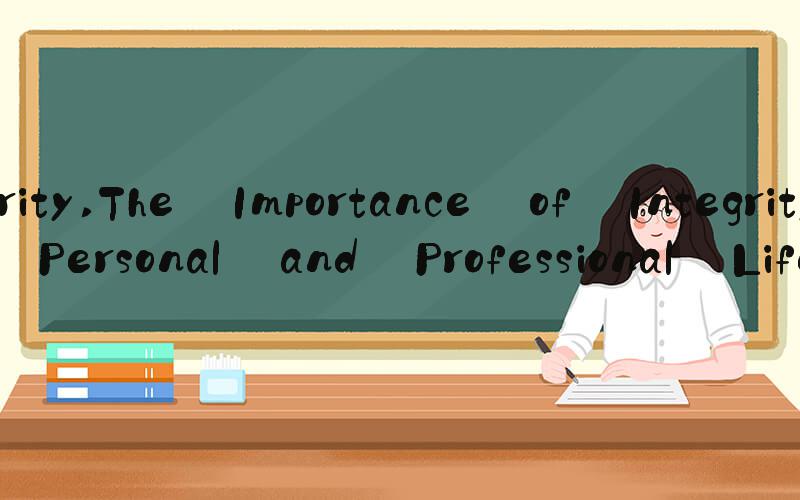
 Integrity: The Importance of Honesty and Moral Character
Integrity: The Importance of Honesty and Moral CharacterIntegrity is the foundation of a person's moral character. It involves being honest, reliable, and trustworthy in all aspects of life. Those who possess integrity are known to have a strong sense of right and wrong and a dedication to upholding ethical principles. In this article, we will explore the importance of integrity in personal and professional life, its impact on relationships, and how to develop and maintain it.
The Importance of Integrity in Personal and Professional LifeIntegrity is essential in personal and professional life as it helps build trust and respect with others. In the workplace, people who are known to have integrity are often entrusted with tasks and responsibilities that require a high level of accountability. Employers seek individuals who can be counted on to adhere to company policies and regulations, respect coworkers, and demonstrate ethical behavior when making decisions.
Personal integrity is also vital for leading a fulfilling life. It allows one to form meaningful relationships built on trust and respect. Individuals with integrity are honest with themselves and others, making it easier to communicate and connect on a deeper level. Practicing integrity can also lead to increased self-confidence and self-respect, enabling one to make decisions that align with their values and principles.
The Impact of Integrity on RelationshipsIntegrity plays a crucial role in building and maintaining relationships. It involves being truthful and reliable when interacting with others, allowing for trust and respect to develop. People who possess integrity are often viewed as role models and sources of inspiration, making them desirable companions in both personal and professional settings.
Conversely, a lack of integrity can strain relationships and lead to mistrust and resentment. When individuals are not truthful or reliable, it can damage the foundation of a relationship, making it difficult to move forward. People who lack integrity are often viewed as untrustworthy and unreliable, making it challenging for them to build relationships based on mutual respect and understanding.
Developing and Maintaining IntegrityIntegrity is not something that one is born with but is developed and maintained through conscious effort. It requires a commitment to upholding ethical principles and making choices that align with one's values and beliefs. Here are some tips on how to develop and maintain integrity:
1. Be honest with yourself and others
Integrity starts with honesty. Be truthful with yourself about your strengths and weaknesses and take responsibility for your actions and decisions. Be honest with others by communicating openly and transparently and avoiding dishonest or malicious behavior.
2. Lead by example
Demonstrate integrity by being a role model for others. Set an example by acting in a way that aligns with your values and principles and upholding ethical standards. People are often influenced by the behavior of those around them, and leading by example can inspire others to act with integrity.
3. Practice self-reflection
Regularly reflect on your actions and decisions to ensure they align with your values and beliefs. When faced with difficult choices, consider the consequences of each option and choose the one that aligns with your principles. Practicing self-reflection can help maintain a consistent moral character.
4. Avoid compromising situations
When faced with a situation that may compromise one's integrity, avoid it. If such a situation is unavoidable, be transparent and communicate openly about any conflicts of interest or ethical concerns. Taking proactive steps to avoid compromising situations can prevent damage to relationships and reputation.
ConclusionIntegrity is a crucial component of personal and professional success. It involves being honest, reliable, and trustworthy, and upholding ethical principles in all aspects of life. The impact of integrity on relationships is significant, and practicing it can lead to trust, respect, and mutual understanding. Developing and maintaining integrity requires a conscious effort to align one's values and principles with actions and decisions. By committing to integrity, individuals can build a strong moral character and achieve success in all aspects of life.
